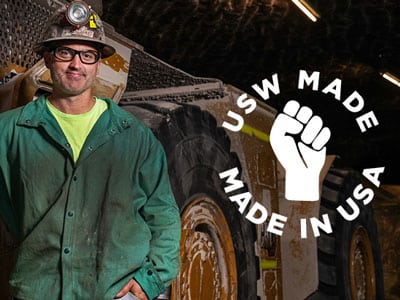The Power of Our Union: On the Island of Puerto Rico, USW Members are Stepping up the Fight for Workers’ Rights

Miguel Cruz spent 31 years as a union worker with Puerto Rico’s electric power authority.
Although he reached an age at which he could retire for good, Cruz still serves as president of his unit and continues to champion the labor movement on the island of 3.3 million citizens, working alongside other USW members and prospective members to build worker power.
“This is my passion,” Cruz said of his union work. “It isn’t about money. It’s about representation.”
Stronger Together
The representation that Cruz fights for – what he calls “the power of our union” – is essential for the 1,000 USW members across Puerto Rico. That’s a number Cruz believes could more than double in the next few years as multiple organizing drives begin to bear fruit on the island, an area about twice the size of the state of Delaware.
Sharon Pérez, Local 6135 president and journalist for GFR Media, said that extending the benefits of collective action to more workers in Puerto Rico will benefit everyone.
“When you’re at the table, you’re negotiating the future for our families,” Pérez said. “There’s no turning back.”
With an amalgamated local that includes workers at Puerto Rico’s largest newspaper as well as more industrial workplaces, Pérez faces the challenge of a diverse membership that is spread out geographically across the island.
For pressroom worker Agustín Santiago and many of his 120 USW siblings at GFR, the topics they typically discuss at the bargaining table – wages, benefits, health and safety, work-life balance – are the same as at other bargaining sessions. Other issues, however, are unique to a work force with a growing number of young, tech-savvy communicators in an ever-changing media landscape.
“We have to get more young members involved,” Pérez said, “so they know the union work is worth it for them.”
Organizing Efforts
Helping more workers – of all ages and industries – gain the benefits of unionism has been part of the USW’s mission in Puerto Rico for more than five decades. However, that work has taken on a greater urgency in recent years.
Before becoming international secretary-treasurer in 2019, John Shinn served for seven and a half years as director of District 4, which includes Puerto Rico and nine northeastern U.S. states. As director, he began to shift more USW resources toward servicing and organizing members on the island, an effort that continued under his successors, including current Director David Wasiura.
“It’s been clear for a long time that more workers in Puerto Rico want and deserve the benefits of unionism,” Shinn said. “With only about three percent of the private sector represented, the situation there offers tremendous opportunities for the labor movement to lift up the voices of working families across all sectors of the economy. Organizing more workers in Puerto Rico is good news for everyone on the island and beyond.”
Strengthening Bonds
Shinn and Wasiura recently joined International President David McCall, along with International Vice President Luis Mendoza, District 10 Director Bernie Hall and a handful of other USW leaders, on a weeklong trip to Puerto Rico to meet with members, visit workplaces, learn about workers’ issues, and strengthen the bond between members on the island and those on the mainland.
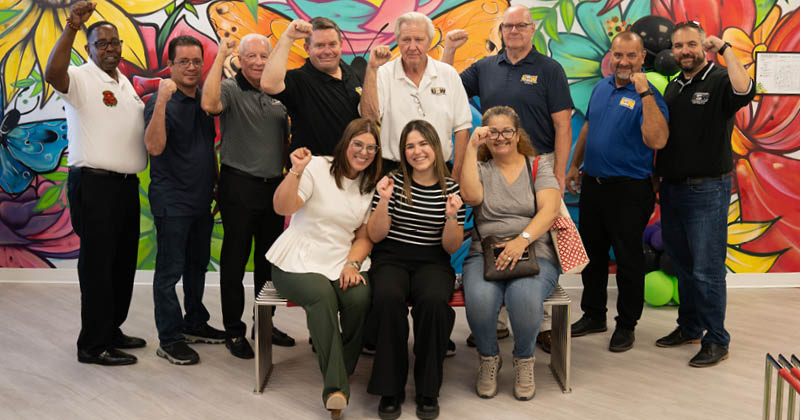
As part of that effort, Wasiura said, members in District 4 want to be attentive not just to the needs of workers, but those of people throughout the communities where they live.
“If we truly want to make a difference in people’s lives, that work can’t end when we walk out the door at the end of the day,” Wasiura said. “We must be invested in the communities where workers live and focus on their well-being day in and day out.”
It was that approach that led Wasiura and other District 4 leaders to become supporters of the GoGo Foundation, an organization named in honor of a childhood cancer patient who passed away. The organization founded a clinic that provides comprehensive pediatric medical care to families in need.
Mayra Rivera, president of Local 8198, which represents municipal employees in Ponce, received a 2021 Multiplying Good award for her tireless activism on behalf of Puerto Rico’s workers and families, particularly in the wake of the devastation of Hurricane Maria six years ago, when she created a community alliance to bring supplies, support and hazard education to residents.
Rivera chose to donate her $500 Multiplying Good prize to the GoGo Foundation, a decision that caught the attention of other leaders in her district and led them to get involved in the foundation’s fundraising.
“It was Mayra’s dedication and generosity that got the ball rolling,” said Wasiura, who joined USW leaders for a tour of the GoGo Pediatric Institute facility last fall. “We hope that the USW’s partnership with the foundation continues for many years to come.”
Series of Setbacks
Despite the hard work of Rivera and many others across the island, some parts of Puerto Rico still have not fully recovered from the devastating effects of Maria, a Category 5 storm that tore through the area in September 2017. It was the region’s worst storm in more than 100 years, killing 3,000 and inflicting more than $90 billion in damage.
Maria destroyed entire neighborhoods and laid waste to much of the island’s electrical grid. A lack of resources and a woefully inadequate federal relief effort only intensified those problems. Five years later, Hurricane Fiona, though not as deadly, brought with it days of massive flooding and more power outages.
For much of the time between those two storms, Puerto Ricans faced a series of earthquakes as well as another deadly crisis – the COVID-19 pandemic.
While that series of setbacks dealt devastating blows to the people of Puerto Rico, the island’s significant financial and infrastructure problems pre-dated those disasters. More than a decade of debt-related austerity, a 2017 bankruptcy and widespread poverty also made the island’s population vulnerable.
So far, the Biden administration’s Infrastructure Investment and Jobs Act has earmarked nearly $700 million in funding for projects in Puerto Rico over 10 years, with more to come.
“Ensuring a strong future for the people of Puerto Rico depends on modernizing infrastructure, providing more strong, family-supporting jobs, and making sure the island is better prepared the next time a disaster strikes,” said Mendoza, the first USW international vice president of Puerto Rican descent. “These investments also will provide a significant economic boost to Puerto Rico’s working families and ultimately benefit every resident.”
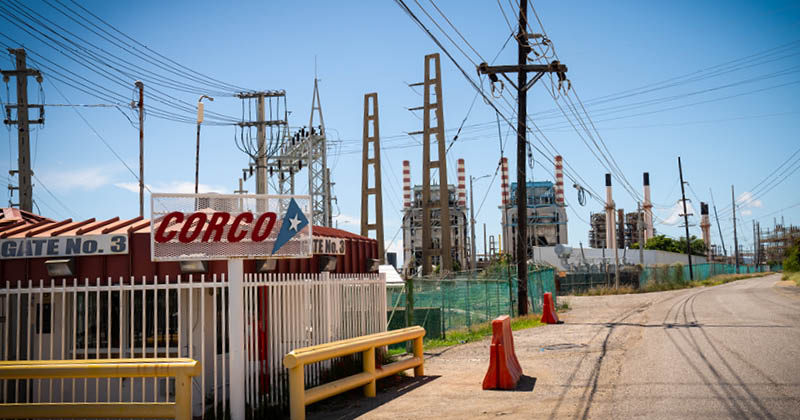
Mendoza was one of about 20 USW leaders and activists whose stories were included in a USW-produced Spanish-language book “De Acero” (or “Of Steel”) – United Steelworkers En Puerto Rico.”
The publication – meant to be circulated widely to members on the island – was just one part of an effort by USW leaders and activists to educate themselves and other workers in Puerto Rico about the USW’s history and to ensure that the voices of Steelworkers are leading the way in strengthening the union’s presence on the island.
Mariel Cruz, who recently became the first woman president of Local 6871, was one member who shared her story in the book.
Cruz, also District 4 Women of Steel coordinator, said the most important thing union members can do is learn about their rights and how to fight for them.
“You have to educate,” she said. “That is the key to everything, to educate and sow the seed for just causes, if we want to have a broad and powerful trade union movement.”
Another story was that of Ernesto Sepulveda Rivera of Local 6588, who produces luxury hand-made carpets for V’Soske Inc.
Those USW-made carpets can be found in the White House, the Vatican, and in the homes of some of the wealthiest people on the planet.
Before he went to work at V’Soske, Rivera already knew the collective power of the USW through stories from his father and grandfather, both of whom made carpets for V’Soske and were proud USW members.
Union Proud
USW members who work at Peerless Oil & Chemicals, Inc., outside of Ponce, express similar pride in the work they do, and in their USW connection. The workers there manufacture and distribute Castrol brand lubricants, detergents, and other petrochemical products at a sprawling site on the southern coast of the island.
Laborer Vladimir Salcedo, who has been a USW member at Peerless for more than 12 years, said he is thankful the union is there to ensure that he and other workers earn fair wages and benefits that allow them to take care of their families, and that they have the equipment necessary to make them safer at work.
“Thanks to the union, we have the PPE we need,” Salcedo said.
Knowing that he and his co-workers have a voice on the job is the most important reason to support the union, said mechanic Esteban Acevedo.
“We have a stable salary that we can count on,” Acevedo said. “And we have someone to stand up for us.”
The USW has a long history of standing up for workers on the island, despite the relatively small number of members there compared to other parts of the United States. That is a situation that members hope they can improve in the coming years as the political climate shifts in favor of unions, and the USW organizes across a number of sectors, including chemicals, pharmaceuticals, paper, and other manufacturing sites.
Over the past year, USW members have held training sessions for rank-and-file organizers and launched an effort to reinforce to workers what it means to be a Steelworker by convening focus groups, seminars, meetings and other educational efforts.
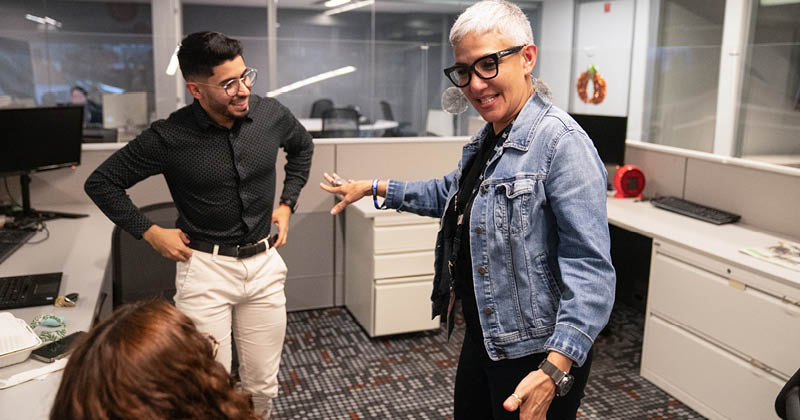
“The working people of Puerto Rico have such a rich history, and the USW is proud to be a part of that,” said International President David McCall. “As we build on that success and continue to organize, workers will have an even brighter future.”
‘The Fight is Coming’
The fallout from Puerto Rico’s bankruptcy led to a push to privatize utilities such as power generation and distribution. That was part of what led Miguel Cruz’s former union, Unión de Empleados Profesionales Independiente (UEPI), to affiliate with the USW in March 2023.
Former UEPI members serve various roles as instrument technicians, construction inspectors and civil engineers.
Miguel Cruz said the USW’s effective representation of thousands of workers in energy and municipal government drove the decision to join the USW.
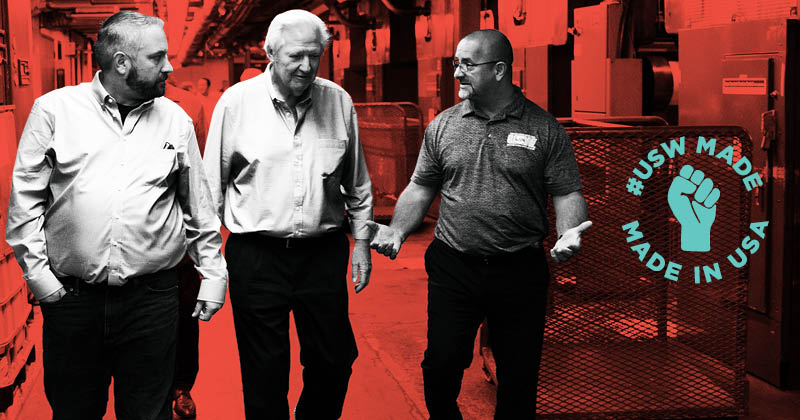
“We knew about the work they achieved representing thousands of workers in the energy sector,” he said.
He said the USW was attractive to the members of the formerly independent union because workers were able to maintain their identity and autonomy, while also growing their power by seeking out others to join the fight.
Puerto Rico’s effort to modernize its electrical grid to make it less vulnerable to weather makes the energy sector a hot spot for union organizing.
“As the transition to the private sector happens, the fight is coming,” Cruz said.
By clicking Sign Up you're confirming that you agree with our Terms and Conditions.
Recent News Articles
Want to Learn More?
See how the USW is making a real difference in our communities and our workplaces.
